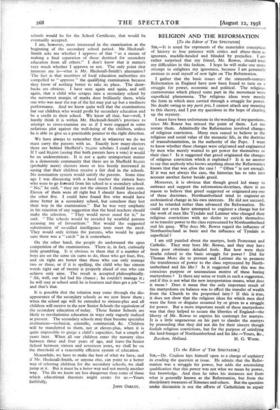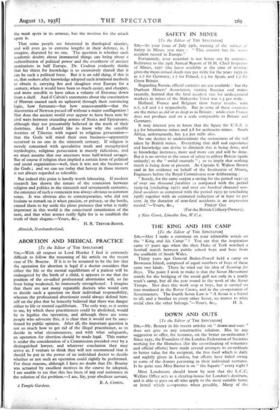[To the Editor of THE SPECTATOR.] SIR, — Dr. Coulton lays himself
open to a charge of sophistry in evading the question at issue. He admits that the Refor- mation was a struggle for power, but adds the astonishing qualification that this power was not what we mean by power, but knowledge. And then he takes his instances- not from what is generally known as the' Reformation, but from the disciplinary measures of Ximenes and others. But the question under discussion is not the efforts of Catholicism to.repair
the weak spots in its armour, but the motives for the attack upon it.
That some people are interested in theological niceties, and will even go to extreme lengths in their defence, is, I imagine, disputed by no one. The question is whether such academic doubts about immaterial things can bring about a redistribution of political power and the overthrow of ancient institutions in half Europe. Dr. Coulton evidently thinks that his thirst for knowledge is so extensively shared that it can be such a political force. But it is an odd thing, if this is so, that seekers after knowledge adopted such irrational methods to obtain it, carrying fire and slaughter over Europe for a century, when it would have been so much easier, and cheaper, and more sensible to have taken a volume of Erasmus down from a shelf. And if Calvin's statements about the constitution of Heaven caused such an upheaval through their convincing logic, how . fortunate—but how unaccountable—that the discoveries of Newton passed off without a major conflagration ! Nor does the ancient world ever appear to have been rent by civil wars between crusading armies of Stoics and Epicureans, although they too presumably believed in the truth of their doctrines. And I should like to know why the sensible doctrine of Tiberius with regard to religious persecution— that the Gods will mind their own business—apparently occurred to no one in the sixteenth century. If religion is merely concerned with speculative truth and metaphysical mythologies, religious persecution is merely ridiculous, and we must assume that our ancestors were half-witted savages. But of course if religion then implied a certain form of political and social organisation—well, then it was not the business of the Gods ; and we can see today that heresy in those matters is not _always regarded as tolerable.
• But indeed this' point is hardly worth labouring. If modern research has shown the nature of the connexion between religion and politics in the sixteenth and seventeenth centuries, the existence of such a connexion was always obvious to common sense. It was obvious also to contemporaries, who did not hesitate to remark on it when passion, or privacy, or the bottle, caused them to lay aside the pious pretence that what is really important in this world is the conjectural constitution of the next, and that what armies really fight for is to establish the truth of their slogans.—Yours, &c., Alnwick, Northumberland.
H. R. TREVOR-ROPER.







































 Previous page
Previous page